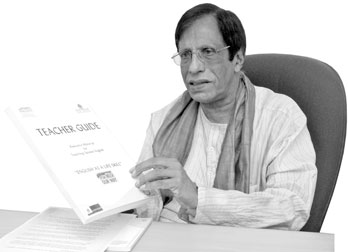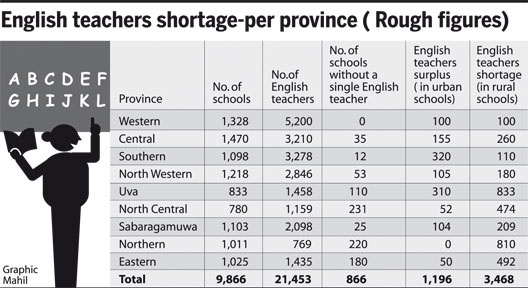'Speak English our way', its pros and cons
There has been a huge hullabaloo about the program 'Speak English our
way', its pros and cons, whether it is just another policy that will be
reduced to a bundle of paperwork, but a few are aware of what 'Speak
English our way' is really about. July 19, 2010 marks the end of phase I
of the initiative and the launch of the second. The Sunday Observer
spoke to Sunimal Fernando, Advisor to the President, Coordinator and
Convener of the Presidential Task Force on English and IT, its agenda,
the current state of the initiative and its achievements.
 |
|
Presidential Advisor
Sunimal Fernando |
"My greatest advantage was that I knew nothing about English
teaching," said Sunimal Fernando. "The President specifically asked me
not to clutter my mind with various theories and models, when I was
first entrusted with the task of 'nationalising' the English language.
Consequently he was forced to develop his own model.
Excerpts
Q: What were the achievements made in phase I of the project?
A: The Ministry of Education for so many years has failed to develop
an English language training cadre to train English teachers. We trained
a national cadre of 80 master trainers in spoken English - selected from
all provinces -at the English and Foreign Language University (EFLU),
Hyderabad with the assistance of the Indian government.
An additional 320 assistants have also been trained. Sixty percent of
the 22,500 teachers in the country were trained to teach spoken English
through an accelerated course that will be completed by the end of the
year. This part of the project is funded by the Education for Knowledge
Society Project (EKSP) of the Ministry of Education, which in turn is
funded by the Asian Development Bank (ADB).
The country's first teachers' guide for spoken English was not
developed by specialists with the help of British or American expertise
but by rural and small town master trainers and teachers from Sinhala
and Tamil speaking homes from all provinces and later used and revised
by the master trainers.
A Sri Lanka-India Centre for English Language Training (SLICELT) with
modern technology and local and Indian resource persons was established
at Peradeniya with the assistance of the Indian government. The
assistance of the Indian government to establish nine Provincial Sri
Lanka-India Centres for English Language Training (PSLICELT) had been
negotiated.
Testing tools for listening and teaching skills, to be implemented
from O Level examination 2012, has been developed by NIE Sri Lanka
(National Institute of Education) and the SLICELT in collaboration with
the Commissioner General of Examinations.
A hundred hour curriculum with teaching aids for a certificate course
in Basic English for the general public was produced by a team of Sri
Lankan ELT trainers and its examination designed. School English syllabi
are currently being scrutinised for and alterations are being made to
suit the capability of Sri Lankan students."
Why has system failed?
Q: In spite of various reforms, revisions of syllabi and millions of
rupees spent, why has the education system failed to produce expected
results in English education?
We observed three critical fundamentals through our discussions
within November 2008 and the first quarter of 2009 of the first phase,
which the whole initiative was based on. We met a few English teachers
in village schools, acquaintances I made through the political process
and my sociological research activities, reaching the most distant parts
of the country. Groups of Sinhala or Tamil speaking English teachers met
informally to discuss why they were failing at their task. These
discussions proved that it was not the fault of the teachers; it was the
policies, teaching methodology and tools imposed on them.
The first fundamental we observed was that the curriculum did not
focus on spoken English. In Britain and other countries where English is
the national language children learn it first through interaction with
the parents, then learn the syntax of the language and spelling at
school.
We adopted the same system for our schools without alteration. This
curriculum only suited the children from the upper middle class urban
families, who perfected their listening and speaking skills early on.
The English speaking upper classes had a lot to gain through imposing
such a system, which prevented 9/10 of the population from gaining
access to information through mastering the language. As a result of
this system children from rural settings only learned to read and write.
This is the method in which dead languages are taught and due to this
most students developed a respect mixed with fear for the English
language creating a psychological barrier that prevents most from
learning English.
 The second fundamental we observed was that the English speaking
enterprise of Sri Lanka at national level and very significantly at the
Ministry of Education level has been controlled by a group of two kinds
of people - the urban elite, who do not have a clue about the capacity
of a village child and had contempt for rural English teachers and
people from rural background who have gained entry into the English
speaking middle class, who are worse than people of the upper class. The second fundamental we observed was that the English speaking
enterprise of Sri Lanka at national level and very significantly at the
Ministry of Education level has been controlled by a group of two kinds
of people - the urban elite, who do not have a clue about the capacity
of a village child and had contempt for rural English teachers and
people from rural background who have gained entry into the English
speaking middle class, who are worse than people of the upper class.
The third fundamental we observed was the focus on British English in
the school curriculum. The anti national ideology of spoken English,
like that of British nationals, with its unblemished diction, perfect
grammar and technically perfect pronunciation was crafted by the
Anglo-centric urban elites.
Our pronunciation, word order and vocabulary are largely Sri Lankan.
Phrases like 'You are going back isn't it' or adding 'no' at the end of
a question statement although grammatically incorrect according to
standard British English, have become a Sri Lankan standard.
The Education Ministry, unlike that of other countries, has failed to
codify the Sri Lankan standard of English - standard vocabulary,
pronunciation, grammar - for the benefit of the teacher. They have
always maintained that only the standard British variety should be
taught in schools. Education promotes the pronunciation of words the
'elocution way'. In fact elocution has done immense damage to the spread
of English skills in the country.
Correct it
Q: How does the initiative 'Speak English our way' hope to correct
it?
Our solution to the first fundamental was teaching children to listen
and speak prior to reading and writing. The average child, having
studied the English language five hours a week for 12 years can't put
two sentences together.
It was pointless to seek the help of the so-called experts in English
Language Teaching. The English teaching enterprise of Sri Lanka, the
existing institutions, strategies and their programs have been a
miserable failure.
The solution to our second fundamental was to replace the monopoly of
the English teaching enterprise with erudite Sinhala or Tamil speaking
English teachers from all provinces, whose names may mean nothing
because they are practically unknown, to decide policy, develop strategy
and craft teaching tools and programs.
The government of India showed tremendous support in training these
personnel.
The solution for the third fundamental was to promote Sri Lankan
English. We decided to give legitimacy to Sri Lankan English where
spoken English is concerned. On June 24, 2009, the road map to promote
spoken/communicative English skills in Sri Lanka was launched.
Q: Why Sri Lankan English?
First of all we must relieve the fear psychosis attached to learning
English, through teaching Sri Lankan English.
Process of evolution
Q: If a 'Standard' is a process of evolution, what would stop the Sri
Lankan standard from evolving into a substandard variety completely
unrecognisable from its original?
Quite the opposite. Taking Sinhala into consideration with the
development of transportation, TV and radio consequently the improvement
of interaction of Southern, Western and Kandyan dialects borrowed from
each other to make a mixed standard of spoken Sinhala. The same goes for
spoken English. Today there is only a slight difference between the
dialects that they have almost merged into one.
With the development of internet and specially telephone
communication the tendency of English would be towards one form of
English.
Q: Is a full scale change in the education system with the
collaboration of the Ministry of Education to be expected any time soon,
with regard to English education?
This process will ultimately amount to that. We are currently
revisiting the school syllabi. We plan to change the syllabus according
to the capability of Sri Lankan students.
The current school syllabi have been developed by university
academics who are quite out of touch with rural reality. The current O
Level syllabus is too much for the children to handle. In fact English
has the lowest pass rate at O Levels on record, which is 30 per cent.
They have imposed enormously high standards so that children can't
learn.
Q: Does that mean that the standard of English at exam level will be
lowered?
No. But there are certain elements of the course which are beyond the
students. Besides, the current syllabi are too extensive to be covered
within the given time frame.
We hope to cut down on the syllabus so it would be easier on the
students. We are prepared to persuade the Ministry of Education to cut
down on the syllabus.
Q: What is in store for phase two?
The staff of the Special Initiatives Unit (SIU) of the Presidential
Secretariat is the operational arm of the Presidential Task Force headed
by Shanthi Fernando, with four other assistants played a crucial role in
running the project throughout the country. These assistants will man a
special presidential program unit, within the Ministry of Education,
that will be established, soon to take charge of the initiative of
improving English as a life skill and will be coordinated by Shanthi
Fernando at the SIU.
Taking of English language skills to the schoolchild will be our next
step. We will also be looking at the community at large. The 100-hour
course of basic spoken English is a result of this objective. This will
be distributed free and will help to standardise teaching of spoken
English in the private sector.
Q: What are the challenges?
The major challenge we face today is the lack of teachers in rural
schools. There is a shortage of 3500 English teachers. Although there
are 22,500 teachers, often through political string pulling, most of
them have been seconded to other urban schools. On one side we have a
shortage and the other a surplus. Politically speaking redeploying the
teachers from urban schools back to rural schools is out of the
question. We plan to persuade the government to recruit new teachers
where there is a shortage. Their letters of appointment should be such
that they cannot be released and seconded to any other school. There is
also a proposition to train and employ retired personnel competent in
the English language as teachers.
- SP
|

